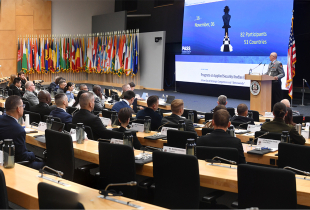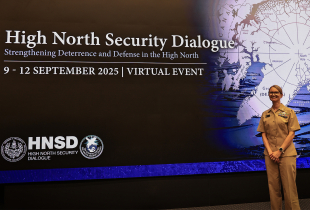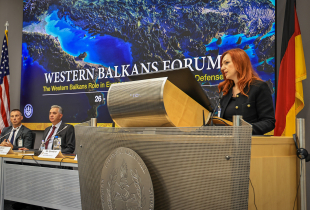
Marshall Center’s Security Seminar Builds a ‘House’ for Future Conflict Management
By Christine June
GCMC Public Affairs
GARMISCH-PARTENKIRCHEN, Germany (May 27, 2015) – The house that the George C. Marshall European Center for Security Studies built for this year's Seminar on Regional Security concluded with lessons learned for future conflicts May 21.
This seminar offers a new perspective on international crisis management with 47 participants from 28 countries conducting case studies on past crises in the Western Balkans and South Caucasus Region, said German Luftwaffe (Air Force) Col. Jörg Kunze, SRS director.
The curriculum consisted of a combination of lectures, seminars and directed studies. Participants also interacted in discussions and conducted a closing peace negotiation exercise using conflict management tools and lessons learned during the three-week seminar.
"What I think is remarkable is that we structured the seminar on building blocks that defined security in contrast to conflict, conflict resolution and crises management to form a solid foundation," said Kunze, who explained that this year's SRS was constructed the same way as one would in building a house.
Kunze said the pillars to the SRS house are the two case studies on Bosnia and Herzegovina, and Georgia, and within the house are tools, which are the international actors like the United Nations, Organization for Security and Cooperation in Europe, NATO and European Union.
An active learning unit or the capstone peace negotiation exercise that applies these tools and lessons learned from the case studies are the roof. There is even smoke coming out of the roof that Kunze said was the conclusions and lessons learned in managing future conflicts – "An experience that the participants can take home."
Ambassador Przemyslaw Grudzinski, who is a former Marshall Center professor and currently the advisor to the Ministry of Foreign Affairs in Warsaw, was the peace negotiation exercise facilitator for this SRS.
"This exercise is very well structured into four working groups – somebody very creatively thought about this organization of the negotiation process – because this is the way to approach the resolution of conflicts. You have to organize certain political processes, which are reflected here in this exercise," Grudzinski said.
Dr. Nora Vanaga, senior researcher at Latvia Ministry of Defense's Centre for Security and Strategic Research, was a member of one of the exercise working group, which represented regional actors from a fictional neighborhood country.
"My seminar group was very thrilled about participating in this exercise," she said. "We really went into our roles and represented this perspective very well. This exercise was a very good experience with conflict management strategies because it put you into someone else's shoes."
Grudzinski agreed that this exercise had an element of reality.
"Of course you have to deal with emotions and the whole psychology when you touch the real thing, but there is the same reality value in this exercise trying to de-conflict and address real problems in real time so the experience for the participants from this exercise is extremely valuable," he said.
U.S. Air Force Col. Paul Tombarge, SRS deputy director, said the intent of SRS is to provide participants with the knowledge and tools needed to address current and evolving regional security challenges.
"We hope the participants leave with those capabilities," Tombarge said, "but we also want them to build and strengthen personal networks within the realm of international crisis management and maintain those networks after they return home."
New for this year's seminar was the added topic of civil society in crisis management and resolution. Additionally, participants had more time to spend on the peace negotiation exercise than in past SRS resident programs.
Participants hailed from: Albania; Armenia; Azerbaijan; Bosnia and Herzegovina; Bulgaria; Croatia; Czech Republic; Estonia; Georgia; Germany; Hungary; Ireland; Italy; Kosovo; Kyrgyzstan; Latvia; Lithuania; Macedonia; Moldova; Montenegro; Romania; Serbia; Slovakia; Slovenia; Turkey; Ukraine; United States; and, Uzbekistan.
The mission of the Marshall Center, as a vital instrument of German-American cooperation, is to create a more stable security environment by advancing democratic institutions and relationships; promoting active, peaceful, whole-of-government approaches to address transnational and regional security challenges; and creating and enhancing enduring partnerships worldwide.
The Marshall Center offers eight resident programs that examine complex transnational, regional and international security issues: Program on Terrorism and Security Studies; Program on Applied Security Studies; Program on Security Sector Capacity Building; Seminar on Regional Security; Seminar on Transnational Civil Security; Countering Narcotics and Illicit Trafficking; Program on Cyber Security Studies; and, Senior Executive Seminar.
For those who are interested in attending a Marshall Center resident program, call the Registrar's Office at +49 (0)8821-750- 2656/2530/2327 or 314-4402-656/530/327, or email.


